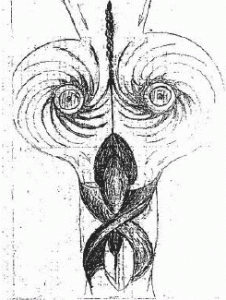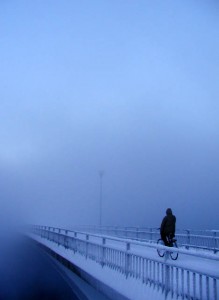In The Wizard of Oz the scarecrow is in search of a brain. It becomes apparent, however, that he already has a brain though he does not seem to know it. Literally and logically, he is a straw man. He is in search of something that he already possesses that he imagines he does not. In the 1939 Hollywood version of The Wizard of Oz Dorothy’s story also has a similar pattern. It is the pattern of losing/leaving something in order to regain it afresh. Dorothy runs away from home only to become lost in the storm. It is a long journey out of the storm back home measured in terms of psychic time, although not that long a journey in terms of material time.
This pattern recalls the biblical story of the prodigal son — the story of the young man who takes his inheritance from his father and leaves home to spend his fortune on sex, drugs and rock’n’roll, as it were, only to find himself years later yearning for a return to his father’s abode. In the closing moments of the Oz movie, The Good Witch of the North instructs Dorothy in the incantation, “There’s no place like home,” and it is this, rather the material conveyance of the balloon, that returns her safely to Kansas.
What is home? It is the essential place. It is the place where meaning has its root. What is this in us? It is the place that evokes yearning for return. It is that which is disregarded or that which we run from which later resonates with the rarest meaning. It is that which we are looking for out in the world of things and transactions that we eventually find closer to us than the jugular vein.
Why leave home in the first place? Ah, there’s the rub. The impulse to strike out on one’s own is a powerful one. Perhaps, it is the impulse of individuality; perhaps it is the genes expressing themselves. We must make our mark. Something must assert itself and this assertion usually first takes the form of “no” — “No way, I’m outta here.” However, the mythos briefly traced here indicates that this get-away has its vicissitudes. It is the return home that gives meaning to the ups and downs of the journey and rescues one from what would otherwise be merely the random fluctuations of fate. The return home occurs when the realization of the ruse of the journey sets in. The yearning for return comes when the end of the tether is reached. In Dorothy’s case this is the rope of the balloon that she loses hold of; it is the balloon which has been prepared to take her back to Kansas; the tether literally slips out of her hands. In the case of the prodigal son it comes when he realizes that the pigs he is tending actually have a better life than he does.
To understand home we must first be divested of our illusions about self-will. For Dorothy these are her illusions about good and evil. What she perceives as evil turns out to have no real substance. Evil is a projection of her own fear for survival as-she-is. When she understands this, she is able to melt the witch with a bucket of water. Furthermore, the “good” Wizard turns out to be media propaganda about a great and powerful boogey-man. For the prodigal son, it is, perhaps, the illusion of the permanence of the ego. In the end, this illusion dehumanizes him under the guise of raising him up.
Of course, there are many interpretations of The Wizard of Oz ranging from the theosophical, to the alchemical, to the economic, to the diabolical, and the purpose here is not to examine these, but to point out that there is this need to sift through experience, the need to discern something of ourselves, for ourselves. It is a need that may lead us to think and feel in a radically new way. In the prodigal son, the joy of return is met with great celebration and is expressed in the language of rebirth.
In terms of chaos mathematics home is a kind of strange attractor that is the place of meaning in the journey. Thus, we can be as mathematical salmon swimming upstream seeking the fine ribbon of current that is actually flowing upstream too, even in the midst of the general torrent of downstream flow. It was Viktor Schauberger who actually observed the phenomena of trout swimming upstream and who envisioned that there must be a reverse current somewhere in the center of the stream that the trout slips into. His observations led him to imagine that this reverse current must in fact be colder than the surrounding downstream flow. He observed fish catching this reverse current and riding it upstream. He built machines that generated vortices to demonstrate this flow; given his reported success the Nazi command attempted to weaponize the technology and harness the energy potential. Schauberger’s apparent lack of interest in this kind of collaboration might explain why he lived out his life in relative isolation in the States.
Schauberger’s story reminds us that deep insight into the possible nature of things runs the risk of providing more existential minds with material to further entrench institutions of power on a mass scale. Furthermore, if the stories about the use of the The Wizard of Oz as a mind-control template are to be taken seriously, there is here too the reminder that insights into the nature of the self and soul can be turned against the impulse of realization and toward something dark, at least from the perspective of building community and conversation. Anthony Blake writes in A Gymnasium of Beliefs in Higher Intelligence that:
We are left with the oxymoron that an essential hidden directorate must be without any existential power. The existential hidden directorate can only seek furtherance of their own power. They must work to keep people asleep. It is known in principle that the most efficient prisons are those in which the inmates themselves act as warders. (118)
In terms of the mythos we are sketching, “essential” refers to the returning home aspect of the journey, whereas the “existential” refers to the forces that would aim to keep us wandering and squandering on the outbound path. Blake suggests that the method the existential directorate has to build prisons is seeding and feeding the belief in the self as the locale of power. A powerful projection of self image reinforces separation and creates the basis for external control of material and psychological spheres.
Returning to the search for a brain, Blake also writes in Gymnasium:
The way we sequence our experience determines how we think. It has been pointed out that our usual sequencing is really retrospective with our usual linear mind structuring elements of experience to produce a story which sustains belief in ourselves. Yet it is possible, at least to some degree and for a little time, to reverse the flow and see into a different kind of world. (127)
This suggests some kind of un-brain, an un-brain that deconstructs the certainty of self, and which maintains freshness by deeply questioning existence. It is the nature of this freshness that is untoward from the perspective of the brain seen as the seat of intelligence. It is a freshness that comes at the expense of certainty in the locality of self, a freshness that in many cases cannot be distinguished from madness and utter bewilderment. After the fatted calf has been killed and the party is over, what is the ongoing work of the prodigal son, now returned? From the story it seems that the father, who after all does not take the opportunity to lecture along the lines of “I told you so…”, has a strange wisdom that the son has only begun to glimpse. Perhaps he will become a student of this wisdom.
We are reminded here of something that Gurdjieff said:
When a man begins to know himself a little, he will see in himself many things that are bound to horrify him. So long as a man is not horrified at himself, he knows nothing about himself. He decides to throw it off, stop it, put an end to it. But however many efforts he may make, he feels that he cannot do this, that everything remains as it was. Here he will see his impotence, his helplessness and his nothingness. Or again when he begins to know himself, a man sees that he has nothing that is his own (original emphasis), that is, that all that he has regarded as his own, his tastes, views, thoughts, convictions, habits, even faults and vices, all these are not his own, but they have been borrowed somewhere ready-made.
(Recounted in Volume 1 of Maurice Nicoll’s “Psychological Commentaries.”)
In reading this there is a part of us, perhaps, that would let it fall into the place of dour self-contemplation. Imagine, for example, If I Only Had a Brain rendered as a turgid lament. Or self-considering along the lines of: maybe I’ve never had such moments of horror. Maybe I need to be dour in order to bring them on. Or maybe this line: yes I see this horror; and this must be the goal! However, such “contemplation” would easily put a stop to actually seeing one’s own accumulated idiocy in action, in media res, as it were. The possibility that one has no place of real knowing and is sewn together from somebody else’s clothes and is a walking, talking logical fallacy is an intensely dramatic kind of un-brain experience. If we allowed ourselves, our leaders, our colleagues, our loved and hated ones without discrimination and without it devolving into some kind of hidden straw man power grab; if we sought an allowance to be the idiots we are, then a certain quantity of spirit might be imbibed to odd effect: Some of these idiocies may be the essential ones that lead us home. Rumi conveys it best:
Whatever we are in front of is the food of love. When we refuse the dish, we thereby attract refusal. It is in the discipline of being present to ourselves as we are that we learn to let go of misery and misfortune and to allow light into our being. Egoism is always looking for what it has to gain and never for what is needed.
(idiotplayers prose adaption of the King and the Handmaiden.)
Gurdjieff relates a peerless story about a Russian merchant who introduces for the first time, through the agency of the need of the moment, the famous phrase: “If you go on a spree then go the whole hog including the postage.” Here is a man that goes with the moment and accepts what has been lying in wait at the end of a sequence of events. He shows us something of the flow of the un-brain. He accepts the momentary humiliation of being overcharged in a book sale at the hands of his ego (the bookseller), perhaps to preserve the value of the book for his son — for whom he is buying it — and to assuage himself over his recent drinking binge while away on business. In any case, there he is in front of himself, more deeply in his essence, sensing perhaps even the constriction of his throat. But still he speaks, and from this, something entirely new opens and enters the existing world.
N.B. The recording attached to this post is of Harburg and Arlen’s comic gem, If I Only Had a Brain. It is an amateur, front-room recording by the idiotplayers not intended for sale or distribution.




Wonderful project, very beautyful recording, very inspiring article – thank you for sharing all this!
All the best for now and tomorrow
Mani
Mani, so glad to know that we’re sharing with someone.
Gregory.